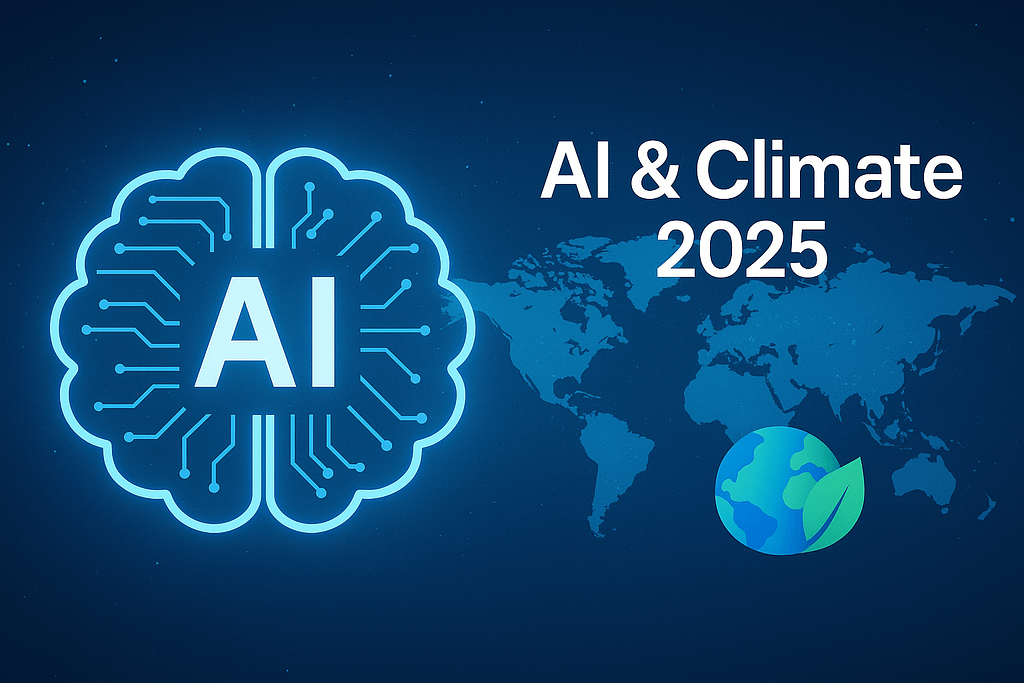Introduction
Climate change is no longer a distant threat — it’s here, and it’s accelerating. From record-breaking heatwaves to unpredictable floods and wildfires, 2025 is shaping up to be a decisive year for global climate action. But there’s one unexpected ally in the fight against global heating: Artificial Intelligence (AI).
AI is transforming the way scientists, governments, and businesses understand and combat climate change. With its ability to process massive amounts of data, detect hidden patterns, and generate predictive models, AI offers powerful tools for creating a sustainable future.
🌡️ The Climate Challenge in 2025
- 2024 was the hottest year on record, with average global temperatures surpassing 1.5 °C above pre-industrial levels.
- Extreme weather events are becoming more frequent, from heatwaves in Europe to destructive typhoons in Asia.
- Governments are under pressure to meet Net Zero targets, but progress is uneven.
Traditional climate modeling is expensive and time-consuming. This is where AI steps in.
🤖 How AI Is Helping in the Climate Fight
1. Climate Prediction & Early Warning Systems
AI-powered models analyze satellite images, weather data, and historical records to predict extreme events such as hurricanes, floods, and wildfires.
- This allows governments to warn communities earlier.
- Insurance companies can calculate risks more accurately.
- Farmers can adapt their strategies to protect crops.
2. Optimizing Renewable Energy ⚡
Wind, solar, and hydro power are key to reducing fossil fuel reliance. AI optimizes:
- Energy grid management – balancing supply and demand in real time.
- Solar panel efficiency – predicting sunlight and adjusting positioning.
- Wind turbine performance – monitoring faults and maximizing output.
3. Sustainable Agriculture 🌱
AI-driven tools help farmers:
- Reduce water usage with smart irrigation.
- Predict crop diseases before they spread.
- Monitor soil health and increase yields sustainably.
4. Reducing Emissions in Cities 🌆
AI helps design smart cities with better traffic flow, energy-efficient buildings, and reduced emissions. Self-learning systems can cut urban pollution significantly.
5. Carbon Capture & Environmental Monitoring 🌳
AI accelerates research in carbon capture technologies and tracks deforestation, illegal mining, or ocean pollution using satellite data.
⚠️ Risks & Ethical Concerns of AI in Climate Action
While AI brings hope, it also raises challenges:
- Energy consumption of large AI models can increase carbon footprints.
- Bias in data may lead to inaccurate climate predictions.
- Tech inequality – developing countries risk being left behind without AI access.
That’s why global cooperation and green AI development are critical.
🌍 Global Initiatives Using AI for Climate
- UN Climate Action: The UN supports integrating AI into global climate monitoring systems.
- Google DeepMind: Developing AI models for wind turbine optimization.
- Microsoft’s Planetary Computer: Analyzing global ecosystems for sustainability projects.
- European Union: Funding “Green AI” research to ensure ethical and energy-efficient models.
💡 What This Means for You
As individuals, we may not build climate models, but we can:
- Support renewable energy projects.
- Use digital tools to track our carbon footprint.
- Stay informed about climate policies.
👉 For digital solutions, secure browsing, and essential online tools, explore Wplax Digital Store.
👉 For travelers concerned about sustainable trips and visa requirements, check Canzar.net.
✅ Conclusion
AI is not a silver bullet, but it’s a game-changing weapon in the fight against climate change. By combining human action with AI-powered solutions, the world has a chance to mitigate global heating, protect vulnerable communities, and build a more sustainable future.
The challenge is urgent, but with innovation, collaboration, and the right tools, 2025 could mark the beginning of a real turning point.
👉 Secure your digital presence with NordVPN as you explore climate news and global platforms.



